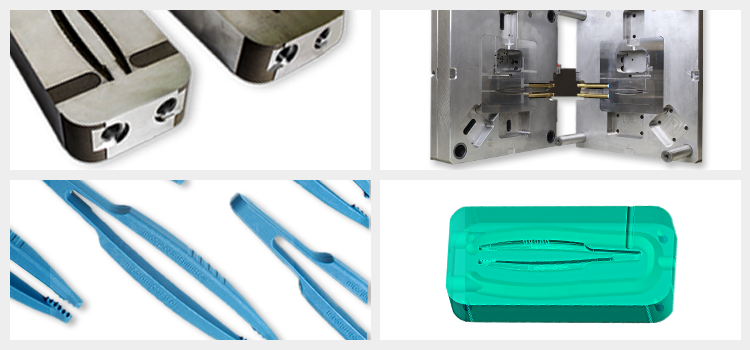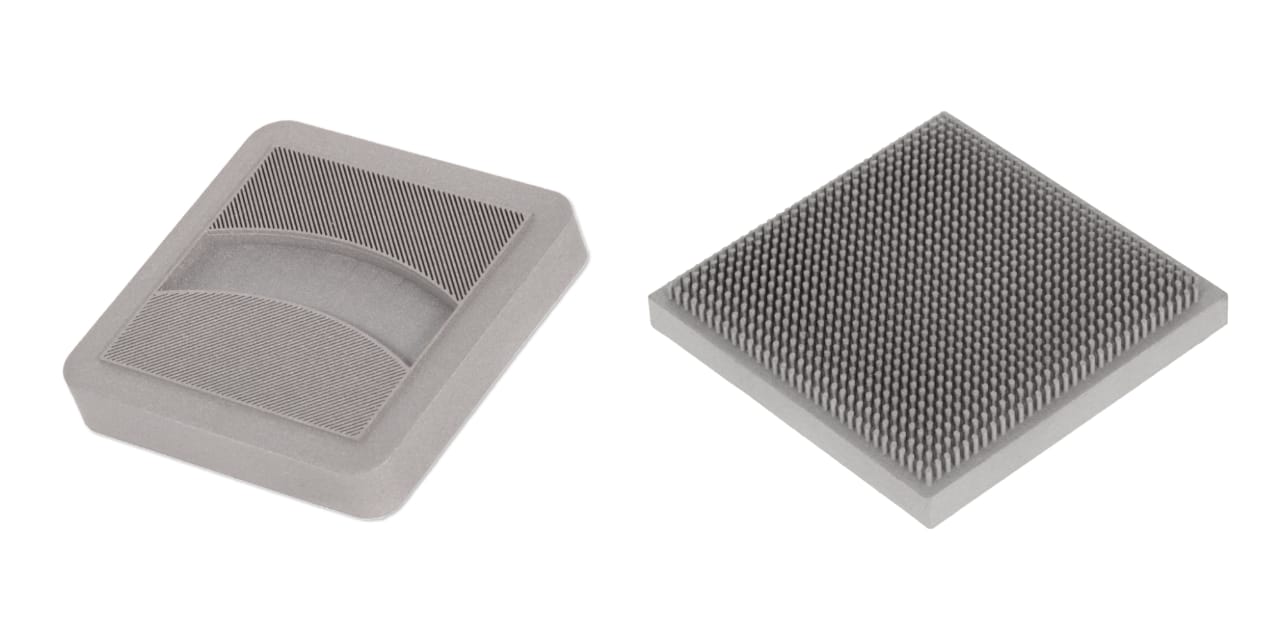MANTLE UNVEILS THREE COLLABORATIONS BASED ON TRUESHAPE 3D-PRINTED TOOLING INSERTS AT PTXPO AND AMUG EVENTS
- COLLABORATION WITH WESTMINSTER TOOL DEMONSTRATES VALUE OF CONFORMAL COOLING FOR BIO-BASED, 65% GLASS-FILLED POLYMER
- COLLABORATION WITH WEPCO PLASTICS DEMONSTRATES SURFACE FINISH SUPERIOR TO ALUMINUM TOOLING
- COLLABORATION WITH PRECISION LASER TECHNOLOGY AND CRAFTSMAN MANUFACTURING DEMONSTRATES THAT MANTLE’S H13 MATERIAL MACHINES AND WELDS LIKE CONVENTIONAL H13 TOOL STEEL
SAN FRANCISCO — March 28, 2022 — Mantle Inc., developer of the most precise and efficient metal 3D printing technology for the tooling industry, will exhibit several recent collaboration successes at two upcoming industry events: Plastics Technology Expo (March 29-31, Rosemont, IL) in booth #1319, and the Additive Manufacturing Users Group (AMUG) Conference ( April 3-7, Chicago, IL) in booth #27, Salon A.
In each collaboration with industry partners, Mantle tool components printed with its H13 Flowable Metal Paste material showed equivalent performance to conventional H13 tool steel. Together, these studies underscore the benefits of Mantle’s TrueShape technology in quickly printing precision components for prototype and production tools, molds, and dies – and going from designs to molded parts in weeks.
Visitors at both events will also learn how Mantle’s hybrid technology – additive and subtractive machining with sintering – works together with its proprietary Flowable Metal Paste in creating high-precision inserts. This singular application focus on toolmaking solutions enables Mantle to optimize the value of its technology for toolmakers.
Conformal cooling handles demanding bio-based polyamide
While drilling conventional metal tooling can only produce straight lines and right angles, Mantle’s technology can print spiral cooling/heating channels that wrap around former hard-to-reach or tall-and-deep geometries. Also known as conformal cooling, this permits molders to control mold temperatures better, shorten cycle times from 25 to 75 percent, improve dimensional stability and surface finish, and facilitate demolding.
Earlier this year, Mantle teamed up with Westminster Tool (Plainfield, Connecticut) to help them make tooling inserts (core and cavity) so they could quickly mold medical forceps sample parts.
Westminster Tool wanted to mold the forceps from a highly glass-filled, bio-based PA11 called Rilsan® FKZM 65 O TD MED, made by Arkema. The material, supplied by a third collaborative partner, Foster Compounds, is focused on surgical device applications and features USP Class VI and ISO 10993 biocompatibility. Healthcare device manufacturers have embraced sustainability goals, and the new bio-based material aligns with this demand. According to Westminster Tool’s Manufacturing Engineer, Eddie Graff, a traditional aluminum prototype tool would present difficulties in molding the highly glass-filled PA11. To solve the problem, he turned to Mantle.
Graff designed the tool inserts to include conformal cooling channels. “These are more effective at controlling the cavity temperature, which is critical to molding this particular material,” says Graff. Mantle then printed the inserts in only 86 hours. “In the end, it took us three weeks to go from design to FOT, quality medical parts on a prototype tool. It’s incredible,” he adds.
Mantle’s printed inserts held a tolerance of +/- 0.0015”. Because they were made with H13 steel, they allowed Westminster to add a sub gate so that they could mold thousands of parts without the risk of gate erosion.

(Top left) Medical forceps tooling inserts with conformal cooling were printed by Mantle via TrueShape technology using H13 Flowable Metal Paste. (Mantle’s 3D printed inserts were accurate within 0.0015″. )(Top right) Westminster Tool used 3D printed tool inserts from Mantle to build the tool and kick off molding in 3 weeks. (Bottom left) Medical forceps parts molded from the tool in Arkema’s new bio-based medical grade, Rilsan® FKZM 65 O TD MED. (Bottom right) Conformal cooling lines helped control the cavity temperature, which is critical for this bio-based polymer material. (Images courtesy of Westminster Tool)
Better surface finish and demolding
Mantle’s TrueShape™ technology produces inserts with a smooth matte surface finish suitable for molding, with a mere 1-3µm Ra surface roughness. Another recent collaboration with Wepco Plastics (Middlefield, Connecticut) sought to evaluate the technology when molding a cellphone stand representative of the consumer market, in which surface finish is often critical to quality.
Wepco Mold Designer Steven Kronenberger worked closely with Mantle’s Senior Application Engineer Scott Kraemer to design the inserts and conformal cooling channels. Mantle then printed them in about 80 hours. Processing setup was swift, and molding the parts in both blue and black ABS plastic produced smooth surface finishes without the time required for polished aluminum, according to Amanda Wiriya, Manufacturing Support Director at Wepco. Not only that, but the machine operators were impressed with how easily parts came off the tool.
“We’ve had issues in the past demolding parts from 3D printed plastic inserts,” says Wiriya. “This was a totally different experience.”

Wepco Plastics was able to go from concept to parts in just a few weeks using Mantle inserts and minimal machining. Surface finish on the ABS cellphone holders was smoother using the lightly polished inserts than it would have been with lightly polished aluminum tooling. (Images courtesy of Wepco Plastics)
Machining and welding like tool steel
While Mantle’s TrueShape technology produces highly accurate tools, these tools may still require welding and/or machining to address engineering changes or reconditioning over a tool’s life cycle. A third project sought to verify that Mantle’s H13 material could undergo these processes without any change to existing machining and welding processes.
This study was conducted with Precision Laser Technology (PLT, Rochester, New York), a service provider focused on laser welding, engraving, texturing, and direct part marking for injection mold, and molded plastics.
For the test, Mantle printed four H13 test bars, and Natale turned to another partner, Kevin Contestabile of Craftsman Manufacturing (Rochester, New York), to precision mill and grind them.
“We wanted to replicate a real-world environment for mold components, one we see as a service provider in the industry,” said Natale. “This would enable us to test how Mantle’s inserts held up to engineering changes or worn parting lines that require welding. We also wanted to test how easy it would be to machine the insert to tighten up tolerances.”
Contestabile performed CNC machining to add a notch and ground three of the four sides. “There was zero evidence of pitting, and the material showed no signs of wheel loading or heat generation using conventional grinding methods,” adds Natale. PLT welded the notch to simulate adding material for an engineering change or building up a worn parting line in a mold. The material accepted the filler wire readily, and Contestabile post-ground the bar again.
The end results were indistinguishable from traditional H13 tool steel. Natale says, “It was a seamless experience, and didn’t disrupt any of the processes in our shop. There were no requirements for special tooling or alterations to the process because of the material. Performance was consistent with conventional H13.”

(Left) Laser welding on a Mantle printed H13 bar at Precision Laser Technologies was indistinguishable from the same process using conventional tool steel, according to PLT’s Ron Natale. (Middle) Laser welded test bars. (Right) Welded bars after grinding show no signs of the weld. (Images courtesy of Precision Laser Technologies)
About Mantle
With headquarters in San Francisco, Mantle helps manufacturers bring new products to life faster, at less cost, and more easily than ever before with its patented TrueShape™ metal 3D printing technology and proprietary Flowable Metal Paste (FMP) materials. TrueShape delivers precision parts that dramatically cut the time and cost of making production-grade tools, molds, and dies. Mantle tools have produced hundreds of thousands of parts for customers – a number that grows each day. To learn more, visit mantle3D.com
Media Contact
press@mantle3d.com

